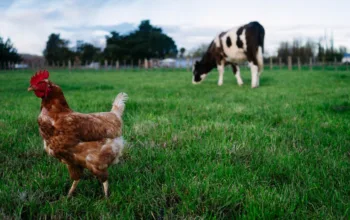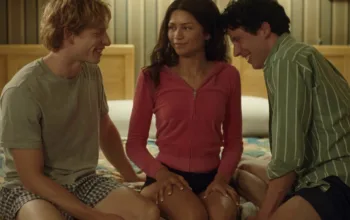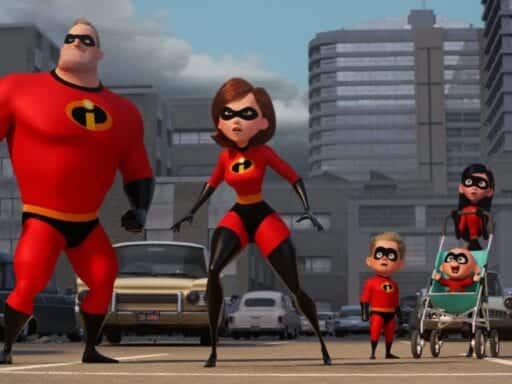
Lots of critics have tried to write Bird off as an objectivist, but the truth is much more complicated.
The most important scene in Brad Bird’s Incredibles 2 comes early on and offers a brilliant summation of everything the writer-director does so well.
The Parr family, having attracted the attention and irritation of the government with their superhero shenanigans, sits in a lonely motel room, munching on Chinese food. They’ve just saved the city of Municiberg from the Underminer, who set his giant drill on a path to destroy City Hall.
But officials don’t see all of the destruction that was averted — they only see the rubble that actually exists. Yes, nobody wants supervillains like the Underminer robbing banks, but there’s a process in place to ensure those banks and the money within them, and having superheroes leap in to save the day just complicates that process.
The scene is notable both for its small, detailed animation — pay attention to how Bob Parr (aka Mr. Incredible) can’t seem to grasp anything with his chopsticks and finally just stabs an eggroll through the middle — and for the way it tosses a bunch of questions the movie knows it can’t possibly answer up into the air. To change the law that has made superheroes illegal, the Parrs will have to break it, to show that superheroes can still be useful. Or, as G-man Rick Dicker wearily sighs in an earlier scene, “Politicians don’t trust anyone who does a good thing just because it’s right. It makes them nervous.”
The first time I saw Incredibles 2, all of these ideas jostling for space within the movie struck me as a movie frantically searching for a story to tell, one it eventually found but that didn’t quite cohere with everything else. The second time through, though, the movie made more sense to me as a meditation on the popularity of superhero stories and what it means to live in a world where what’s legal isn’t always what’s right. It doesn’t offer solutions, because it knows there aren’t any.
But the movie is also keyed in to something that’s always present in Bird’s work, something that’s caused some to accuse him of being an objectivist along the lines of Ayn Rand: an obsession with the rights of the exceptional and how they can be stacked up against everybody else.
Incredibles 2 strikes me both as Bird’s deepest exploration of this idea and his biggest refutation of it. Bird might be fascinated by the exceptional among us, but he’s also not interested in exceptionalism if it doesn’t benefit the larger community.
Why some critics think Brad Bird is a Randian objectivist
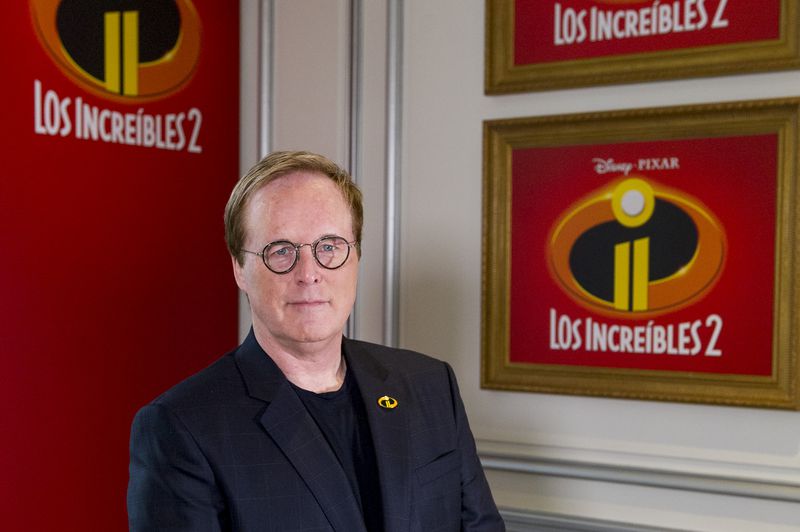 Photo by Juan Naharro Gimenez/Getty Images for Disney
Photo by Juan Naharro Gimenez/Getty Images for DisneyThe works of author Ayn Rand — including Atlas Shrugged, The Fountainhead, and others — have been hugely influential on the thinking of various political and economic theorists over the years. (Among current politicians, Republican House Speaker Paul Ryan is a notable devotee.) To put Rand’s writings in modern terms, you could describe her objectivism as a kind of extra-strength libertarianism, in which the truly great among us should, as much as possible, not be shackled by the law or by conventions.
Atlas Shrugged is her magnum opus, a futuristic dystopia in which citizens who don’t contribute to society leech off the business classes, who create both wealth and useful material goods (mostly trains and railroads). The action of the book — if a book so heavy in long discussions of philosophy can be said to have “action” — mostly involves the various characters learning that society needs them more than they need society, that the world is only as strong as its strongest, who should be subject to as few rules and regulations as possible. Rand stops just short of saying, “Billionaires should be able to straight-up murder whomever they want,” but reading the book, you have to think the idea occurred to her at some point.
This is a vast oversimplification of a book I read once in high school for an essay contest, but Rand’s ideas that regulations are bad and wealth creators are good have trickled down into the modern Republican Party in ways that are hopefully obvious.
The question is if they’ve also trickled down to influence the films of Brad Bird, one of modern animation’s few auteurs, but also a writer-director who keeps returning to the idea that society places unnecessary constraints on exceptional individuals. You can see where the comparisons come from.
Bird has made just six films — 1999’s The Iron Giant, 2004’s The Incredibles, 2007’s Ratatouille, 2011’s Mission: Impossible — Ghost Protocol, 2015’s Tomorrowland, and 2018’s Incredibles 2 — and four of those wrestle with the above idea at length. There’s a touch of that idea in Iron Giant (which we’ll get to), but it doesn’t dwell on it at length, while Ghost Protocol (one of the finest modern action movies) is mostly about how it would be totally rad to free climb the world’s tallest building. (Ghost Protocol and Tomorrowland are live-action; the other four films are animated.)
The “objectivist” tag was first applied to Bird extensively after the first Incredibles. And to be sure, the very premise of the film plays in this territory: superheroes have been outlawed due to safety concerns, and one character bellows, “With everyone super, no one will be!” This is particularly true of a concluding scene in which young Dash Parr, blessed with super-speed, intentionally throws a race at a track meet. The plot reason for this is that he can’t let anybody know he has superpowers (which are still illegal), but it plays as a weird critique of the idea of participation trophies and the attempt to make sure no child’s feelings are hurt.
The criticism followed Bird through Ratatouille — which is ostensibly about how anyone (even a rat) can cook but is also kind of about how if you don’t have talent, you should get out of the way of people who do — and especially Tomorrowland, in which a group of geniuses abscond to an alternate universe where they build the sci-fi future imagined in the ’50s and ’60s and mostly abandoned in our modern era of imagined dystopias.
A world where the exceptional cordon themselves off and refuse to save the rest of the world is literally Galt’s Gulch from Atlas Shrugged, where the book’s mysterious hero, John Galt, hides out to proclaim his superiority to everybody else. And now Incredibles 2 toys with many of these same themes, which makes sense as a continuation of the first film. (When I asked him about these themes, he mostly punted on answering the question, saying he didn’t think about it that much when writing his movies.)
I think it’s worth considering all of these ideas in the context of Bird’s career, which got a bit of a late start. After beginning as a young wunderkind animator at Disney in the early ’80s, Bird was fired after raising his concerns that the company was half-assing it, instead of trying to protect its rich legacy.
Bird spent much of the ’80s bouncing from project to project — he worked on, among other things, a Garfield TV special and the Amazing Stories episode “Family Dog” (his directorial debut) — until in the early ’90s, he landed a job as the animation supervisor on a new TV show named The Simpsons, a job that made his career and allowed him to direct Iron Giant. When that movie flopped, he was brought to Pixar thanks to a college friendship with John Lasseter (who has recently been pushed out of the company after accusations of sexual misconduct).
But his directorial debut still didn’t arrive until he was in his early 40s. And while that’s not exactly unprecedented, it is at least a little unusual in an industry where someone with the evident talent of Bird likely would have proceeded through the ranks of a major animation company and directed his first film somewhere in his 30s.
Bird’s self-admitted demanding nature likely make him difficult to work with — something that surely contributed to his difficulty getting a film made, despite numerous almost-realized projects, like an animated adaptation of the comic The Spirit. (Bird was also probably hurt by his certainty that “animated film” and “kids film” shouldn’t be synonymous, even though animated films aimed at adults have always been difficult sells in Hollywood.) It makes sense that Bird’s frequent musings on the shackling of genius might be a political, but it’s just as possible this is an artistic idea, based on the struggles he had getting his career to take off. (My friend David Sims has had similar thoughts at the Atlantic.)
So, yes, we could read Bird’s filmography as a celebration of Ayn Rand and of climbing very tall buildings. But we’d be remiss if we didn’t also read it in the context of the career of a director who felt stymied at every turn for almost 20 years, before he unexpectedly became one of the most successful directors of his generation almost out of nowhere.
Even then, we’d be missing something big.
Bird’s movies usually dig into how giving the exceptional unlimited power only results in disaster
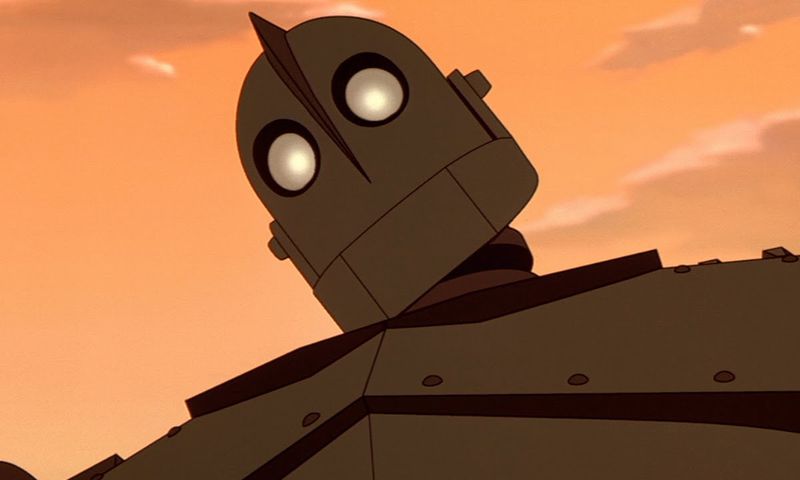 Warner Brothers
Warner BrothersOne of the things that makes that early motel-room scene in Incredibles 2 so potent is the fact that there’s no clear right answer to the issues that Bird raises via his characters. Nor is there a right answer in a later scene in which Helen Parr (Elastigirl) talks with a new friend about whether the ability to create something great or the ability to sell it to the mass public is more important to the world. Nor in the frequent arguments about whether breaking unjust laws is the right thing to do, even if society requires people to be law-abiding to function.
It’s impossible for any animated movie to truly be “timely” because they’re produced on such a long timeframe. But Incredibles 2 feels eerily tapped in to the political debates we’re having around the globe right now. If you have massive amounts of power and feel like the world is circling the tubes, is your primary duty to society or to the self? Or your family? Or all of the above? Brad Bird doesn’t know this answer, so the movie doesn’t either.
This is a common thread across his filmography. All of his movies grapple with objectivist themes, to be sure, but they also don’t conclude that doing what’s best for the self is what’s best for everybody. The closest thing to an answer Bird ever provides is “Do what’s right, and what’s right is what benefits the most people.”
In short, his movies always posit that the exceptional should be allowed to express their talents to the best of their abilities — but only insofar as they can benefit society at large.
What’s interesting is how often Bird’s most openly objectivist moments and story ideas are presented as bad things. That collection of geniuses making up Tomorrowland, for instance, invents a machine meant to bring doom to our world, while the famous line about being special or super from Incredibles is actually spoken twice — the first time by a child and the second time by the movie’s villain. Helen is the closest thing the Incredibles franchise has to a moral conscience, and she’s always the one on the side of the idea that “everyone is special.” We just have different talents.
Ratatouille might be the best developed expression of this idea among Bird’s films. His portrayal of a restaurant as a collection of people who do very specific jobs to the best of their abilities, all adding up to a kind of symphony, is very much like filmmaking, with the film’s hero, Remy the rat, standing in as a director. The movie’s villains are those who would stand in the way of Remy realizing his full talents — but you can also read that as being against prejudice, as a celebration of the idea that anyone can cook and great art can come from someone you’d never expect (like a young and hungry would-be animator from Montana, not exactly a hotbed of Hollywood talent).
It’s telling that Ratatouille’s great chef is a rodent and not the gangly human who discovers he’s the son of a great, dead chef. Talent isn’t always predictable, following along conduits you’d expect. But when you find it, it’s best to encourage it but also make sure it’s tempered with kindness, as it is in Ratatouille, a movie where even the restaurant’s waitstaff is briefly but memorably celebrated.
All of which brings us back to The Iron Giant, a movie rarely discussed in conversations about Bird’s interest in exceptionalism. If any Bird creation is exceptional, it’s a giant metal man who eats railroads and can become a literal death weapon, but the arc of the film is about the giant trending away from that which makes him exceptional and would harm others, and toward what about him is exceptional that could benefit others. It’s a movie about a really amazing walking gun who decides, instead, to become Superman.
Superman’s a fitting icon to consider as a way to understand Bird’s ultimate philosophies. Yeah, he could kill all of us with a flick of his fingernail, but he doesn’t. So could the superheroes of Incredibles 2, but they make the choice not to.
That’s why Incredibles 2 stands so beautifully as Bird’s most fully engaged wrestling with all of these ideas. It never offers easy answers because there aren’t any. The question of how we build a society that benefits everybody and gives them the same rights as everybody else, while still allowing people as much freedom as possible to exercise the talents and abilities unique to them, isn’t one that can be answered easily. It’s arguably the work of democracy itself, and it will never be finalized, as long as human beings strive for a better world. Thus, those of us who are exceptional, be they people or rodents or whole countries, are only as exceptional as they are good.
While it’s not always easy to determine the right course of action, determining what’s good almost never is. It’s what takes you away from celebrating the self and back toward figuring out how that self can fit into the community of others, how your own exceptionalism can become a part of the great symphony of life.
Read More
https://cdn.vox-cdn.com/community_logos/52517/voxv.png
